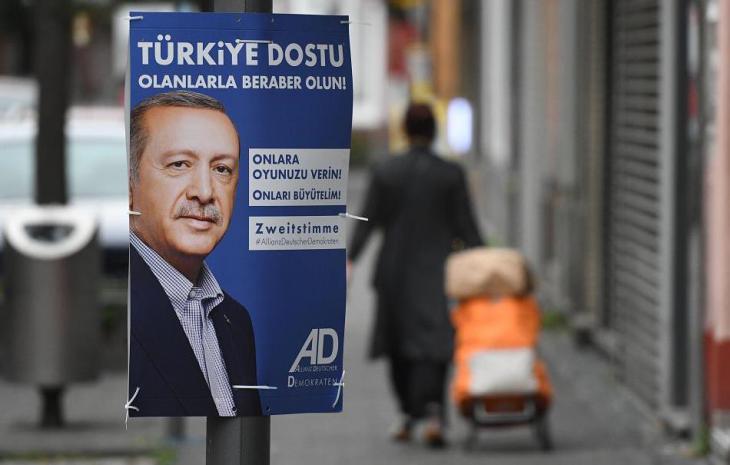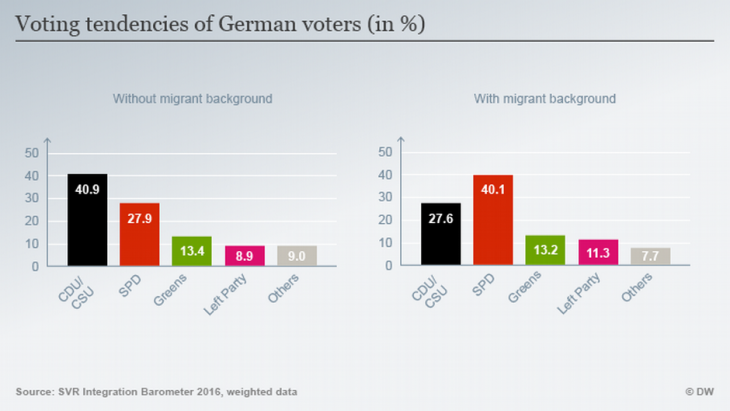Calling all Muslim voters: ″Won′t vote″ won′t wash

There are German voters of Turkish descent who seriously intend heeding the call of Turkish President Erdogan, who has urged Turks living in Germany not to vote for candidates from the CDU, SPD or the Greens. Yet it is absurd to imagine that obeying Erdogan's call for a boycott is going to teach German political parties allegedly hostile to Turkey a lesson!
Recommendations are circulating in social media for voters of Turkish origin living in the German state of North Rhine-Westphalia (NRW) to cast their ballot for the Alliance of German Democrats. NRW is the only federal state where the ADD party, founded one year ago by Erdogan supporters, is up for election. What the party's founders and its candidates present to voters is real life satire: they are campaigning for seats in parliament using Erdogan's picture on election posters.
The Internet is also abuzz with calls for Muslims in general to vote for the “Bundnis Grundeinkommen” with its platform to introduce an unconditional basic income. But they are also being urged to boycott the elections entirely – based on the argument that it is "haram", a sin, for Muslims to take part in elections at all. Or that the established parties are universally hostile to Islam and the Muslims.
Fortunately, here in Germany we live in a democracy. Many envy our right to vote – particularly people living in Islamic countries. In Germany, all adult citizens are entitled to vote, but no one is forced to go to the polls. Each voter can give his vote to the party of his choice or decide not to vote at all.

But Erdogan supporters or Muslims who choose not to cast a ballot are not doing themselves any favours. Some of the Islamic associations are drawing attention to this fact shortly before the elections.
Decision-making aid
The Islamic community Milli Gorus, for example, has launched an eight-part video project under the hashtag #WahlenGehen (get out and vote). And the Central Council of Muslims has published a decision-making aid called the "German Muslim Election Compass" in co-operation with the "Islamische Zeitung" newspaper and the "German Muslim League".
For pious Muslims it is undoubtedly relevant to know which party supports a headscarf ban and what religious practices will be possible in this country in the long term. However, without wanting to downplay the debates surrounding the headscarf ban and dress codes, the circumcision of boys, halal slaughter or the building of mosques: waiving the right to vote because none of the parties in the running expressly advocates for the interests of Muslims is not a good decision!
There are issues that are important to all citizens of this country beyond their religious affiliation. Unemployment for instance. Or poverty in old age, which affects not only long-time residents, atheists and Christians, but also immigrants and Muslims.

And those who focus in terms of educational policy solely on which party is committed to Islamic religious instruction fail to recognise that the real crux of the matter lies elsewhere: namely, the need for policies that support equal opportunities for all children and young people.
A closer look at the various campaign platforms
Climate change, social justice and labour market policy are also topics that affect us all – regardless of whether we are Christians, Muslims, Jews, Buddhists or atheists.
Anyone who bases his decision on whether or not to go to the polls and cast a ballot for one party or the other only on whether a party is supposedly friendly to Turkey, or whether it advocates for the interests of Muslims and the Islamic community in Germany, is focusing too much on his own origins or religious identity. And thus the very same people who loudly protest that they are being reduced to their religion or ethnic background risk contradicting themselves.
When reaching a sensible decision, it is helpful to examine more closely the campaign platforms of the individual parties – and not only in relation to God, faith and commandments. Those who want to make themselves heard as Muslims living in this country and who want to be viewed as equal citizens should exercise their civil rights – and not allow themselves to become the tools of foreign leaders or to be lulled into apathy by Islamist fundamentalists.
Canan Topcu
© Qantara.de 2016
Translated from the German by Jennifer Taylor
